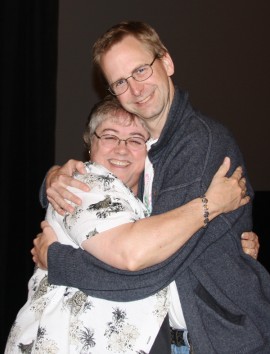Words Can Hurt
Words Can Hurt
What Words Should We Use?
Words You Should NOT Use
People First Language
Don’t Overreact!
Words Can Hurt
Everyone knows words can hurt. For people with Down syndrome and their families, the history of “labels” is not a pleasant one. People with Down syndrome used to be labeled “idiots, morons,” and “imbeciles” by both society and the medical profession. The label evolved into “Mongoloid, handicapped, mentally retarded, retarded,” and then for short, “retard.”
Today, these labels are considered politically incorrect, hurtful and dehumanizing. As award-winning actor, parent-advocate, and Global Down Syndrome Foundation International Spokesperson, John C. McGinley has said, there is no difference between derogatory words used to label ethnic or religious minorities and the words used to label people with Down syndrome. As with people advocating for ethnic or religious minorities, there is a movement (led by Special Olympics) to end the use of derogatory words such as the “R” word – ‘retard.’ You can join the movement or learn more by clicking here.
What Words Should We Use?
Renowned educator and inclusion specialist Patti McVay emphasizes “the best name to call someone is the name he or she was born with.” Many organizations, including the federal government and the National Institutes of Health, have gone back to scrub their old records of the word “mentally retarded” and have replaced it with “intellectually and developmentally disabled,” with the acronym of IDD. Other organizations are using cognitive disability, intellectual disability, or developmental disability. Still others use the word “challenged” instead of disability. There are subtle differences in the definitions based on each organization and even by state, but most importantly any of these terms are accepted as appropriate by the community being defined. For the Global Down Syndrome Foundation, we like to take it a step further and talk about our community as “differently-abled.”
Words You Should NOT Use
 Down syndrome is named after a doctor in the UK named John Langdon Down. Originally, it was referred to as his syndrome – Down’s Syndrome. In the UK, Europe and many other countries, the correct term still remains “Down’s Syndrome.” In the U.S., it was changed to Down syndrome (drop the possessive) as to emphasize that it was not Dr. Down who had the syndrome nor was it his.
Down syndrome is named after a doctor in the UK named John Langdon Down. Originally, it was referred to as his syndrome – Down’s Syndrome. In the UK, Europe and many other countries, the correct term still remains “Down’s Syndrome.” In the U.S., it was changed to Down syndrome (drop the possessive) as to emphasize that it was not Dr. Down who had the syndrome nor was it his.
People who are differently-abled and their families have a lot to offer society. Down syndrome is not a disease but rather a genetic condition whereby a person is born with three copies of chromosome 21 versus two. For these reasons, many, but not all families, take offense to the following terms being used in conjunction with Down syndrome:
Disease – it is not a disease
Cure – while the overwhelming majority of individuals with Down syndrome and their family members would want to improve the health outcomes of individuals with Down syndrome, including cognition, many families are offended by the word “cure” because the word is imbued with negative connotations and the word:
- relates to a disease
- has been used synonymously with abortion and termination
- implies a radical change to who a person is
Suffer from or afflicted by – people with Down syndrome may have medical issues or intellectual and developmental delays that are clearly associated with the condition, however, many families feel their loved one with Down syndrome does not suffer from Down syndrome but rather from medical issues surrounding the syndrome or from incorrect medical treatment or timing.
The Global Down Syndrome Foundation recommends people NOT to use any of the terminology above with families or individuals with Down syndrome.
People First Language

Renowned inclusive education expert Patti McVay is all about the love, seen here with a Global Down Syndrome Foundation supporter.
What’s wrong with saying Down’s kids? Down’s people? Or Down’s moms? In terms of grammar, the first two are technically correct. The third, if you pause, does not make sense as the mom does not have Down syndrome.
Despite grammar, within the differently-abled community, there has been a movement to educate society about “People First Language” that helps (1) give more dignity to the individual who is differently-abled, and (2) provides a language that is not imbued with stereotypes and preconceived ideas about the individual who happens to be differently-abled to society in general.
The renowned educator and inclusion specialist, Patti McVay, often provides this useful exercise:
- Think of something that you don’t like about yourself that society has also deemed less desirable.
- Now take that word and put it in front of your name and imagine being called that word plus your name all your life.
- For me, the word “fat” comes to mind. The idea that I could be called “Fat Patti” all my life isn’t somewhere I’d like to go…
Below are some ways you can consider talking about people with Down syndrome to the extent you need to bring up the condition at all:
- people with/who have Down syndrome, people who happen to have Down syndrome
- children with/who have Down syndrome, children who happen to have Down syndrome
- adults with/who have Down syndrome, adults who happen to have Down syndrome
- individuals with/who have Down syndrome, individuals who happen to have Down syndrome
- people/children/adults/individuals with Down syndrome and their families
Don’t Overreact!
Even a parent of a child with Down syndrome takes some time to adjust to the “Dos and Don’ts” regarding words associated with our community.
So please give people a chance and do not overreact by criticizing, attacking, or acting upset by someone’s inadvertent use of “politically incorrect” words. First and foremost, consider the source and the intention (educated? well-meaning?). Then consider if that person can change their terminology or behavior. For example, there are MANY older advocates who fought for human and civil rights for our children back in the 1960s and 1970s who still say “mentally retarded” even when talking about their own family member. As they have used this term for decades it may be unrealistic to get them to change, yet we stand on their shoulders for helping to pass the American with Disabilities Act and the Individuals with Disabilities Education Act – so please do show these people the utmost respect.
For people you meet in social groups, religious gathering and such, you can use a politically incorrect moment to educate what words would be more appropriate. A simple, kindly correction can make a huge impact on how that individual talks about our community in the future.
For reporters, it is important to give them training about the power of words prior to them writing a story. Providing the reporter a list of politically correct terminology or directing them to this section of the Global Down Syndrome Foundation website will go a long way to ensuring that the story will be strong and positive.
In addition, it is important to know the reporter’s story and perhaps even the headline of the story will be changed by at least one editor and the editor may add politically incorrect terminology. So long as the story is a positive one for the Down syndrome community, ALWAYS thank the reporter and the publication for covering your community, and then kindly educate them regarding correct terminology to use.
If we want society to embrace people with Down syndrome, it is important that our community is kind, inclusive and ready to educate.

 Experience our inspirational and groundbreaking videos and photos. Our children and self-advocates are beautiful AND brilliant!
Experience our inspirational and groundbreaking videos and photos. Our children and self-advocates are beautiful AND brilliant! Make sure your local Representatives are on the Congressional Down Syndrome Task Force.
Make sure your local Representatives are on the Congressional Down Syndrome Task Force.